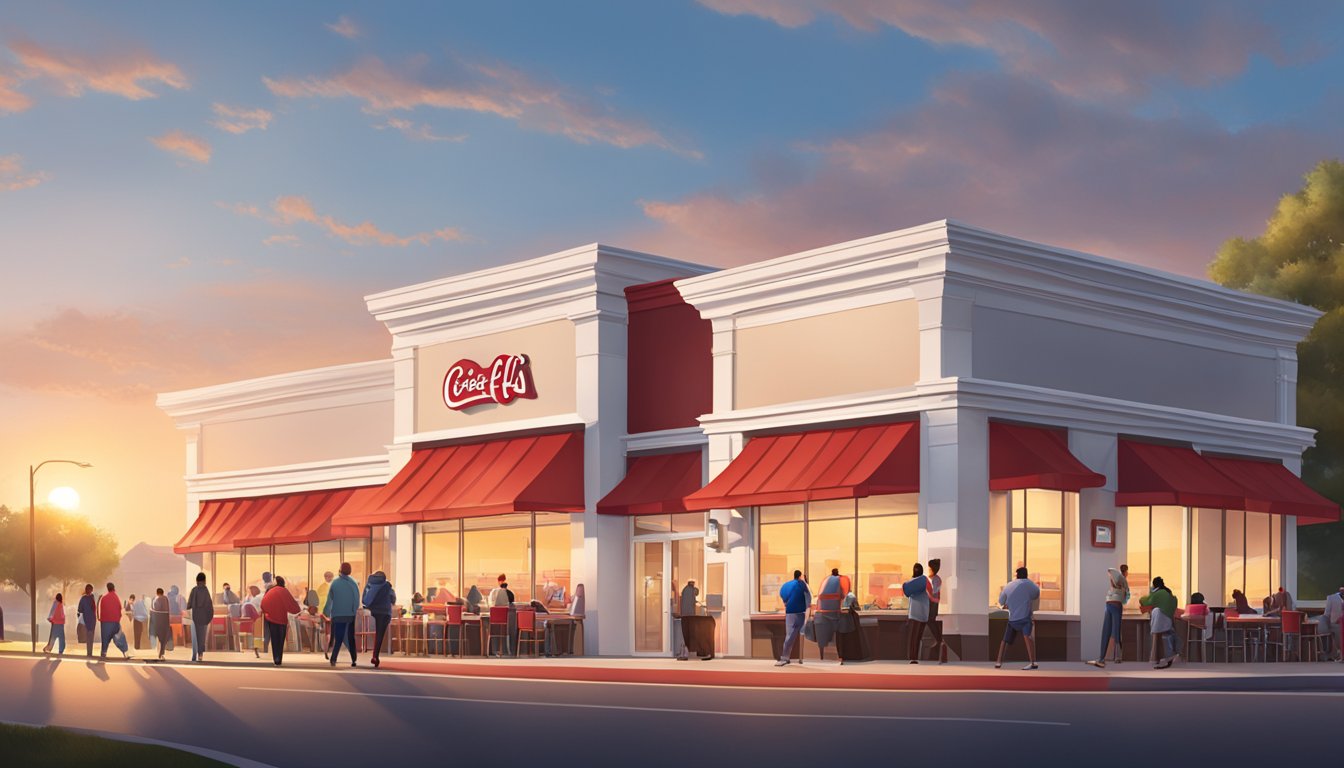Chick-fil-A’s foray into breakfast offerings marks a significant brand extension for the popular chicken chain. Known primarily for its chicken sandwiches and exceptional customer service, the company has successfully leveraged its reputation to capture a slice of the competitive breakfast market. This move aligns with Chick-fil-A’s strategy of slow and steady growth, which has seen the company more than triple its annual sales between 2007 and 2018.
Chick-fil-A’s breakfast menu, featuring items like the Egg White Grill, has helped shift consumer perceptions of the brand towards healthier options. This strategic expansion not only diversifies the company’s offerings but also taps into the growing demand for nutritious morning meals. By maintaining its commitment to quality and service while adapting to changing consumer preferences, Chick-fil-A demonstrates its ability to evolve without compromising its core values.
The success of Chick-fil-A’s breakfast initiative can be attributed to its careful alignment with the brand’s established identity. The company’s focus on creating a connected experience for customers extends to its morning offerings, ensuring consistency across all dayparts. This approach has contributed to Chick-fil-A’s impressive growth, with system-wide sales reaching $16.7 billion in 2021, a 22% increase from the previous year.
The Evolution of Chick-fil-A’s Breakfast Menu
Chick-fil-A’s breakfast menu has undergone significant changes since its inception, reflecting the brand’s commitment to innovation and meeting customer demands. The evolution showcases the chain’s ability to adapt while maintaining its core focus on quality chicken offerings.
Pioneering the Chicken Sandwich
Chick-fil-A’s breakfast journey began in 1985 with the introduction of the chicken biscuit. This innovative offering came just before the company opened its first stand-alone location.
The chicken biscuit quickly became a breakfast staple, setting Chick-fil-A apart from competitors. It combined the chain’s signature chicken with a Southern breakfast favorite.
As the menu expanded, Chick-fil-A added hash browns as a side option. This move further solidified their position in the breakfast market.
Expanding the Breakfast Frontier
In the following years, Chick-fil-A continued to diversify its breakfast menu. The chain introduced a variety of healthier options to cater to changing consumer preferences.
A notable addition was the Grilled Chicken Sandwich, offering a leaner alternative to the original breaded version. This expansion demonstrated Chick-fil-A’s adaptability to evolving dietary trends.
The breakfast menu now includes items like yogurt parfaits and fruit cups. These additions cater to health-conscious customers while maintaining the brand’s commitment to quality food.
Chick-fil-A serves breakfast from 6 a.m. to 10:30 a.m., Monday through Saturday. This limited timeframe has created a sense of exclusivity around their breakfast offerings.
Brand Extension Strategy
Chick-fil-A’s breakfast menu exemplifies a successful brand extension rooted in core values, strategic marketing, and industry innovation. This expansion leveraged the company’s existing strengths while introducing new offerings to capture morning customers.
Understanding Chick-fil-A’s Core Values
Chick-fil-A’s brand extension into breakfast aligns seamlessly with its core values of quality, service, and customer satisfaction. The company’s commitment to fresh ingredients and made-to-order meals extends to its morning offerings. Chick-fil-A ensures consistency across all menu items, maintaining brand identity.
The breakfast menu reflects the company’s dedication to hospitality. Staff members continue to provide the same level of attentive service during morning hours. This approach reinforces customer trust and loyalty.
Chick-fil-A’s religious values also play a role in its breakfast strategy. The company remains closed on Sundays, even during potentially lucrative breakfast hours. This decision upholds its principles and distinguishes it from competitors.
Marketing Strategy and Customer Loyalty
Chick-fil-A’s marketing approach for breakfast focuses on building upon existing customer relationships. The company leverages its loyal customer base to promote morning offerings through targeted campaigns and word-of-mouth recommendations.
Social media plays a crucial role in Chick-fil-A’s breakfast marketing. The brand uses platforms like Instagram and Twitter to showcase new menu items and engage with customers. User-generated content, such as photos of breakfast meals, helps create buzz and authenticity.
Chick-fil-A’s rewards program incentivizes customers to try breakfast items. Points earned during morning visits can be redeemed for free menu items, encouraging repeat business across different dayparts.
Local store marketing initiatives, such as community events and partnerships with nearby businesses, help raise awareness of breakfast options. These efforts reinforce Chick-fil-A’s position as a neighborhood staple.
Innovation in the Fast Food Industry
Chick-fil-A’s breakfast menu showcases innovation in fast food offerings. The company introduced unique items like the Chicken Biscuit and Egg White Grill, differentiating itself from traditional breakfast fare.
Technology plays a key role in Chick-fil-A’s breakfast service. Mobile ordering and drive-thru innovations, such as outdoor ordering tablets, streamline the morning rush. These advancements reduce wait times and improve customer experience.
Chick-fil-A continually refines its breakfast menu based on customer feedback and market trends. The introduction of healthier options and customization choices demonstrates the brand’s adaptability and commitment to meeting evolving consumer preferences.
The company’s focus on quality extends to its breakfast beverage offerings. Chick-fil-A’s premium coffee program, featuring specialty-grade beans, elevates the morning experience and competes with dedicated coffee shops.
Chick-fil-A’s Advertising and Community Engagement
Chick-fil-A’s innovative advertising and strong community ties have solidified its position as a beloved fast-food brand. The company’s unique approach combines clever marketing campaigns with local involvement to create lasting connections with customers.
Crafting Positive Brand Awareness
Chick-fil-A utilizes a mix of traditional and digital advertising to build brand awareness. Their billboards feature simple, eye-catching designs that often incorporate their iconic cow mascots.
Social media plays a crucial role in their strategy, with engaging content across platforms like Instagram and Facebook. The brand’s posts frequently highlight new menu items and promotions.
Television commercials focus on family values and quality food, reinforcing Chick-fil-A’s wholesome image. These ads often showcase real customers and employees, adding authenticity to their messaging.
Local sponsorships of youth sports teams and school events help Chick-fil-A integrate into communities. This grassroots approach fosters goodwill and strengthens customer loyalty at a neighborhood level.
Eat Mor Chikin: A Marketing Campaign Case Study
The “Eat Mor Chikin” campaign, launched in 1995, has become one of the most recognizable in fast-food advertising. Featuring cows encouraging people to eat chicken instead of beef, the campaign’s humor and consistency have made it a long-lasting success.
Billboards with cow-painted messages are a staple of the campaign, often sparking social media shares and discussions. The cows appear in various media, from TV ads to social media posts, maintaining a cohesive brand message.
Chick-fil-A extends the campaign into community events, with costumed cow mascots making appearances at local gatherings. This interactive element brings the brand to life and creates memorable experiences for customers.
The campaign’s effectiveness lies in its simplicity and adaptability. By keeping the core message consistent while adjusting to new platforms and trends, Chick-fil-A has maintained relevance in a competitive market.
Customer Service Excellence
Chick-fil-A’s commitment to exceptional customer service has become a cornerstone of its brand identity. The company’s focus on personalized experiences and exceeding customer expectations has set a new standard in the fast-food industry.
Elevating the Customer Experience
Chick-fil-A’s approach to customer service goes beyond typical fast-food interactions. Employees are trained to use phrases like “my pleasure” instead of “you’re welcome,” creating a more polite and welcoming atmosphere. The company emphasizes eye contact, smiling, and genuine engagement with customers.
Chick-fil-A staff often go above and beyond to assist customers. In one instance, an employee helped a customer retrieve a phone dropped in a storm drain. These acts of kindness and attentiveness contribute to enhanced customer satisfaction and loyalty.
The restaurant chain also focuses on creating a clean, comfortable dining environment. Staff members regularly check on customers, refill drinks, and clear tables promptly. This attention to detail ensures a positive experience from order to departure.
Employee Training and Brand Values
Chick-fil-A invests heavily in employee training, recognizing that well-prepared staff are essential to delivering excellent customer service. New hires undergo extensive training programs that cover not only food preparation and safety but also customer interaction techniques.
The company’s core values, including respect, integrity, and genuine care for customers, are instilled in employees from day one. This value-driven approach helps create a consistent customer experience across all locations.
Chick-fil-A empowers its employees to make decisions that benefit customers. Staff members are encouraged to resolve issues on the spot, often without needing managerial approval. This autonomy allows for quick problem-solving and personalized solutions.
The company’s emphasis on employee satisfaction also contributes to better customer service. Happy employees are more likely to provide exceptional service, creating a positive cycle that benefits both staff and customers.
Digital Transformation and Customer Engagement

Chick-fil-A has embraced digital technologies to enhance customer experiences and drive growth. The company’s focus on innovative solutions has revolutionized its ordering processes and customer interactions.
Seamless Digital Ordering and Mobile App
Chick-fil-A’s mobile app has become a cornerstone of its digital strategy. The app allows customers to place orders, customize meals, and pay with ease. It also integrates with the company’s loyalty program, rewarding frequent customers with points and free items.
Drive-through experiences have been streamlined with digital menu boards and mobile ordering capabilities. Customers can now place orders before arriving, reducing wait times and improving efficiency. This integration of digital and physical experiences has significantly enhanced customer satisfaction.
The app’s user-friendly interface and personalized recommendations have contributed to increased customer engagement. Push notifications keep users informed about special offers and new menu items, driving repeat visits.
Leveraging Data Analytics for Customer Satisfaction
Chick-fil-A’s data-driven approach has transformed its decision-making processes. The company analyzes customer behavior, preferences, and feedback to continually improve its offerings and services.
By tracking ordering patterns, Chick-fil-A optimizes its menu and inventory management. This data-centric strategy ensures popular items are always in stock, reducing customer disappointment and maximizing sales opportunities.
Customer feedback collected through digital channels is systematically analyzed to identify areas for improvement. This proactive approach to addressing concerns has bolstered customer loyalty and satisfaction.
Predictive analytics help Chick-fil-A anticipate rush hours and staff accordingly, minimizing wait times during peak periods. This data-driven staffing model has improved both customer and employee experiences.
Commitment to Community and Family Values

Chick-fil-A’s dedication to community and family values forms a core part of its brand identity. The company actively pursues initiatives that strengthen local communities and support charitable causes.
Fostering Community Involvement
Chick-fil-A encourages its franchise owners to engage with their local communities. Many locations host family-friendly events and fundraisers throughout the year. These activities range from spirit nights for schools to donation drives for local charities.
Franchise owners often participate in community leadership roles, joining chambers of commerce or serving on nonprofit boards. This hands-on approach helps Chick-fil-A build strong relationships with customers beyond the restaurant setting.
The company’s Leadership Scholarship Program awards millions in educational assistance to team members annually. This investment in employee development reflects Chick-fil-A’s commitment to fostering growth within its community of workers.
Supporting Charitable Organizations
Chick-fil-A partners with various charitable organizations to make a positive impact. The Chick-fil-A Foundation focuses on youth and education, awarding grants to nonprofits across the United States.
Key initiatives include:
- Junior Achievement: Supporting financial literacy programs for students
- Covenant House: Providing resources for homeless youth
- True Inspiration Awards: Recognizing community organizations making a difference
The company also responds to natural disasters through its Shared Table program. This initiative donates surplus food to local shelters and food banks, reducing waste while helping those in need.
Chick-fil-A’s day of service, called “Founder’s Day,” honors the legacy of its founder by encouraging team members to volunteer in their communities. This annual event reinforces the company’s values of service and giving back.
The Legacy of S. Truett Cathy
S. Truett Cathy pioneered a fast-food empire built on quality food and exceptional service. His entrepreneurial journey and business principles shaped Chick-fil-A into a beloved American brand.
From Dwarf Grill to Fast Food Icon
In 1946, Cathy opened the Dwarf Grill in Hapeville, Georgia. This small diner became the birthplace of his signature chicken sandwich. Cathy’s innovation and focus on quality ingredients set the foundation for Chick-fil-A’s success.
The first Chick-fil-A restaurant opened in 1967 in Atlanta’s Greenbriar Mall. Cathy’s marketing strategy centered on the unique chicken sandwich and personalized customer service. This approach resonated with consumers and fueled the chain’s rapid expansion.
By 1982, Chick-fil-A had grown significantly, marking a turning point for the company. Cathy’s leadership guided the brand through decades of growth while maintaining its core values and commitment to quality.
Instilling a Culture of Quality and Service
Cathy’s business philosophy emphasized more than just food. He prioritized creating a positive customer experience and fostering a strong company culture. Employees were trained to respond with “my pleasure” to customer thanks, a practice that became a hallmark of Chick-fil-A’s service.
The company’s core values, rooted in Cathy’s Christian faith, influenced its operations. This included the policy of closing on Sundays, which became a distinctive aspect of the brand’s identity.
Cathy’s leadership style and principles shaped Chick-fil-A’s brand perception. His focus on quality, service, and values created a loyal customer base and a respected corporate image. This legacy continues to guide the company’s operations and communication strategies today.




